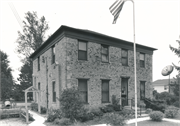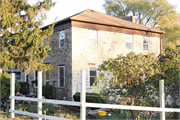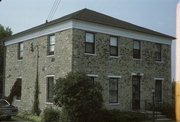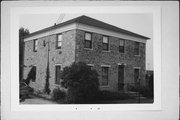Property Record
565 W STATE ST
Architecture and History Inventory
| Historic Name: | Pliny Merrick & Ellen A Perkins House |
|---|---|
| Other Name: | |
| Contributing: | |
| Reference Number: | 10676 |
| Location (Address): | 565 W STATE ST |
|---|---|
| County: | Racine |
| City: | Burlington |
| Township/Village: | |
| Unincorporated Community: | |
| Town: | |
| Range: | |
| Direction: | |
| Section: | |
| Quarter Section: | |
| Quarter/Quarter Section: |
| Year Built: | 1845 |
|---|---|
| Additions: | |
| Survey Date: | 19752011 |
| Historic Use: | house |
| Architectural Style: | Two Story Cube |
| Structural System: | |
| Wall Material: | Cobblestone |
| Architect: | |
| Other Buildings On Site: | |
| Demolished?: | No |
| Demolished Date: |
| National/State Register Listing Name: | Not listed |
|---|---|
| National Register Listing Date: | |
| State Register Listing Date: |
| Additional Information: | A 'site file' exists for this property. It contains additional information such as correspondence, newspaper clippings, or historical information. It is a public record and may be viewed in person at the Wisconsin Historical Society, State Historic Preservation Office. BRICK QUOINS. COBBLESTONE FACADE. Perkins was an abolitionist. He also operated a grist mill and a woolen mill. He was a stockholder in the American Freeman. Pliny Merrick Perkins, son of Ephraim and Lucy Perkins, was born around 1812 in Trenton, New York. As a child, he migrated with his family to Joliet, Illinois, before they settled in Burlington in 1837. At that time, Pliny and his father purchased a dam and saw mill under construction by Moses Smith and Samuel C. Vaughn on the southwest bank of the Fox River for $2,600. The Perkins completed the dam and saw mill. The building of the dam caused the permanent flooding of the Fox River, forming what became known as Mill Pond, which was later named Echo Lake. The dam has since been replaced; the saw mill is no longer extant. After the saw mill’s completion, Ephraim and Pliny Perkins constructed an adjoining flour mill. It was the first flour and grist mill in Racine County. There they produced the first commercial shipment of flour from Wisconsin to eastern American markets under the brand name Echo, which was shipped from Kenosha to Buffalo, New York. By 1839, Pliny and his father also purchased a log cabin built by Moses Smith near the saw mill in which they operated Burlington’s first general store. The cabin was demolished sometime around the turn of the twentieth century. Pliny Perkins partnered with Hugh McLaughlin to build a boarding house, known as the Burlington Hotel, at the corner of Milwaukee Avenue and Chestnut Street in 1839. The general store was relocated to a portion of the hotel within a year. The Perkins and McLaughlin Burlington Hotel was later demolished. On the same day as Silas Peck’s original plat for the settlement at Burlington on May 24, 1839, Pliny Merrick Perkins recorded plats for his first and second additions to the Town of Burlington. Streets in this area are named after members of his family, including Conkey, James, and Origen Streets. The Perkins family’s milling business prompted the construction of the first road to Lake Michigan at Kenosha in 1841. In 1843, Pliny Merrick Perkins built a water-powered woolen mills, across the Fox River dam from his family’s saw and flour mills, which he leased to James Catton for five years. The Pliny Perkins woolen mill is believed to have produced the first commercial roll of cloth in Wisconsin and made uniforms for Union soldiers during the Civil War. In 1846, Pliny Merrick Perkins married Ellen A. Conkey. Around this time, he constructed a house at 565 W. State Street. Three of the house’s walls are coarse masonry, the front façade being covered with cobblestones uniquely graded from the smallest at the bottom to the largest at the top. During the mid-1840s, Pliny Perkins was a stockholder in the abolitionist newspaper, the American Free Man, published in Milwaukee, and later Waukesha. The American Free Man was one of the first abolitionist newspapers in the Midwest, and had agents finding sympathetic supporters and delivering the paper throughout Racine and Kenosha Counties. Also during the mid-1840s, Pliny Perkins constructed a new, larger stone flouring mill which was 40- by 60-feet and 4-stories high. The old flouring mill took on use as an oil mill. The larger mill, known as the Burlington Flouring Mill, was heavily damaged by fire in 1864. After rebuilding and the addition of new machinery, the mill reopened in 1865. After acquiring partial interest in the mill the year prior, Maurice Ayers purchased the flour mill and dam in 1879. It has since been demolished. Also in 1864, Pliny Perkins offered 10 acres of land along the White River on Chestnut Street between Conkey and James Streets to the Racine County Agricultural Society on which to construct new fairgrounds for the annual Racine County Fair held there until 1885. In 1869, he sold his State Street house and constructed another on Milwaukee Avenue. It later became used as a clubhouse for the Burlington Business Men’s Association, and was moved to Bohner’s Lake in 1939 and repurposed as a tavern. Pliny Perkins retired from operating his mills in 1871, leaving his sons, James and Edward Perkins, and son-in-law, Andrew Lawton, in charge of the mill’s operation. Two years later, Elias N. White took over management. The woolen mill operated until it was destroyed by a fire in 1880. Pliny Merrick Perkins passed away in 1881. |
|---|---|
| Bibliographic References: | ZIMMERMANN, RUSSELL "THE HERITAGE GUIDEBOOK" (HERITAGE BANKS 1976). The Underground Railroad in Burlington and Vicinity, Burlington Historical Society, 2002, pp. 11-12, 14. General Files. On file at the Burlington Historical Society, Burlington, Wisconsin. |
| Wisconsin Architecture and History Inventory, State Historic Preservation Office, Wisconsin Historical Society, Madison, Wisconsin |




